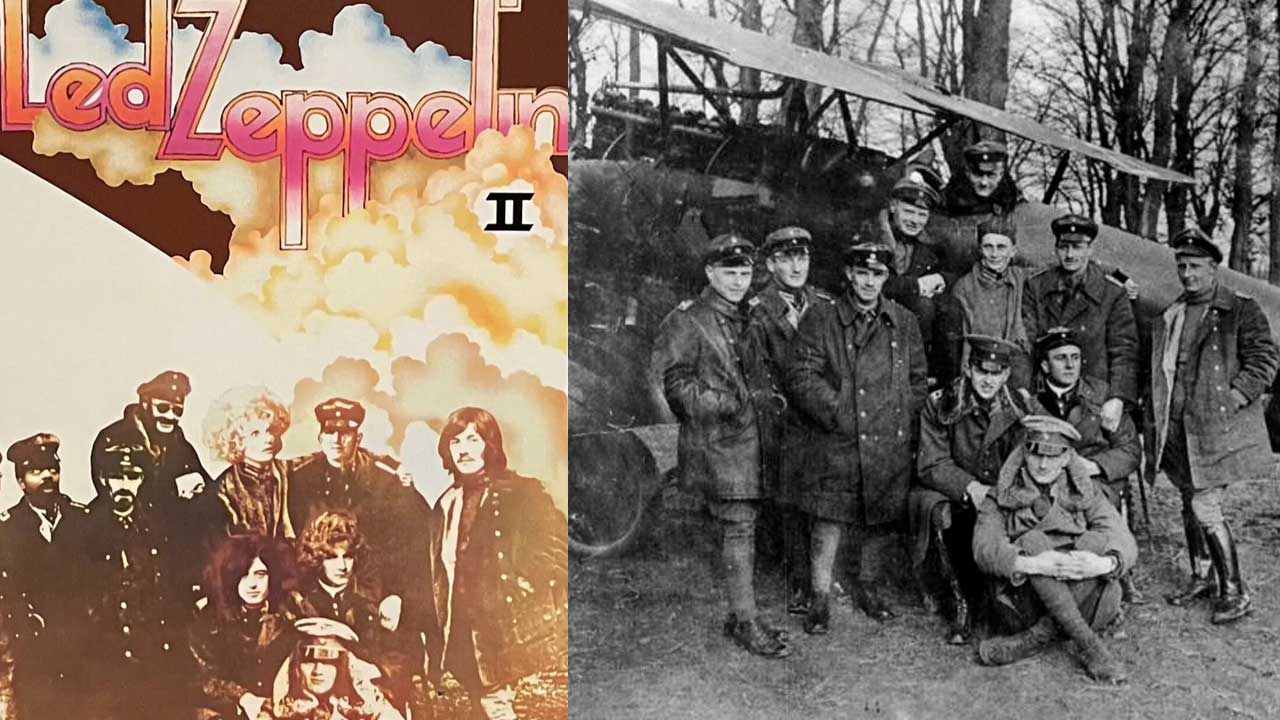
Led Zeppelin's debut album was adorned by an adapted version of Sam Shere's iconic photograph of the German zeppelin Hindenburg bursting into flames upon landing in New Jersey 1937, but it wasn't the only time the band turned to German flying machines for inspiration.
For the artwork for Led Zeppelin II, designer David Juniper – who'd attended Sutton Art College in Surrey with Jimmy Page – turned to a First World War-era photo from the German Federal Archive, which showed the legendary fighting ace Manfred Albrecht Freiherr von Richthofen, a.k.a. the Red Baron, sitting in the cockpit of an Albatros D.III fighter aircraft alongside members of his fighter squadron, Jagdstaffel 11 Division.
In Juniper's adaption of the original image, von Richthofen is obscured by plumes of smoke, but the faces of the other pilots are replaced by the members of Led Zeppelin.
"The music of Led Zeppelin I had blown me away and so, on spec, I mocked up a fold-out design for the second album and took it to (Zeppelin’s manager) Peter Grant and Micky Most at Rak Records," Juniper told the Album Cover Hall of Fame in 2007. "I had a few friends starting to get into the music industry and they helped to point me in their direction.
"The combination of collage/photography and airbrush illustration was groundbreaking for me, because the traditional airbrush technique was very tricky, especially when compared to today’s digital equivalents. All the faces were replaced or altered (sunglasses & beards on some of the pilots!).
"In amongst the four band members (airbrushed in from a publicity photograph) are Miles Davis (or was it Blind Willie Johnson?), a girlfriend/muse of Andy Warhol (perhaps Mary Woronov?) and the astronaut Neil Armstrong."
This doesn't clear matters up entirely. The only known photo of Blind Willie Johnson isn't the face seen in the picture, and others have suggested that Armstrong's face is more likely to be that of fellow Apollo astronaut Frank Borman. Others have claimed that the female face belongs not to Woronov but to English actress Glynis Johns, perhaps most famous for her role as Winifred Banks in Walt Disney's Mary Poppins.
It's been surmised that the inclusion of Johns was an in-joke reference to Glyn Johns, who engineered Zeppelin’s debut album but reportedly claimed he had produced it. So, by way of retort, the band included his mother's face on the cover. Also in the picture are Led Zeppelin manager Peter Grant and road manager Richard Cole.
The design was wrapped in an elaborate gatefold sleeve that opened up to show the shadow of a Zeppelin airship, while the sleeve’s distinctive outer colouring earned the album the nickname 'The Brown Bomber' in America.
Juniper was nominated for a Grammy Award for Best Recording Package in 1970, but lost out to Evelyn J. Kelbish and David Stahlberg's swiftly forgotten cover for Gary McFarland's orchestral jazz suite America The Beautiful (An Account Of Its Disappearance). Proof, perhaps, that the folk at the Grammy organisation were as out of touch back then as they appear to be today.







